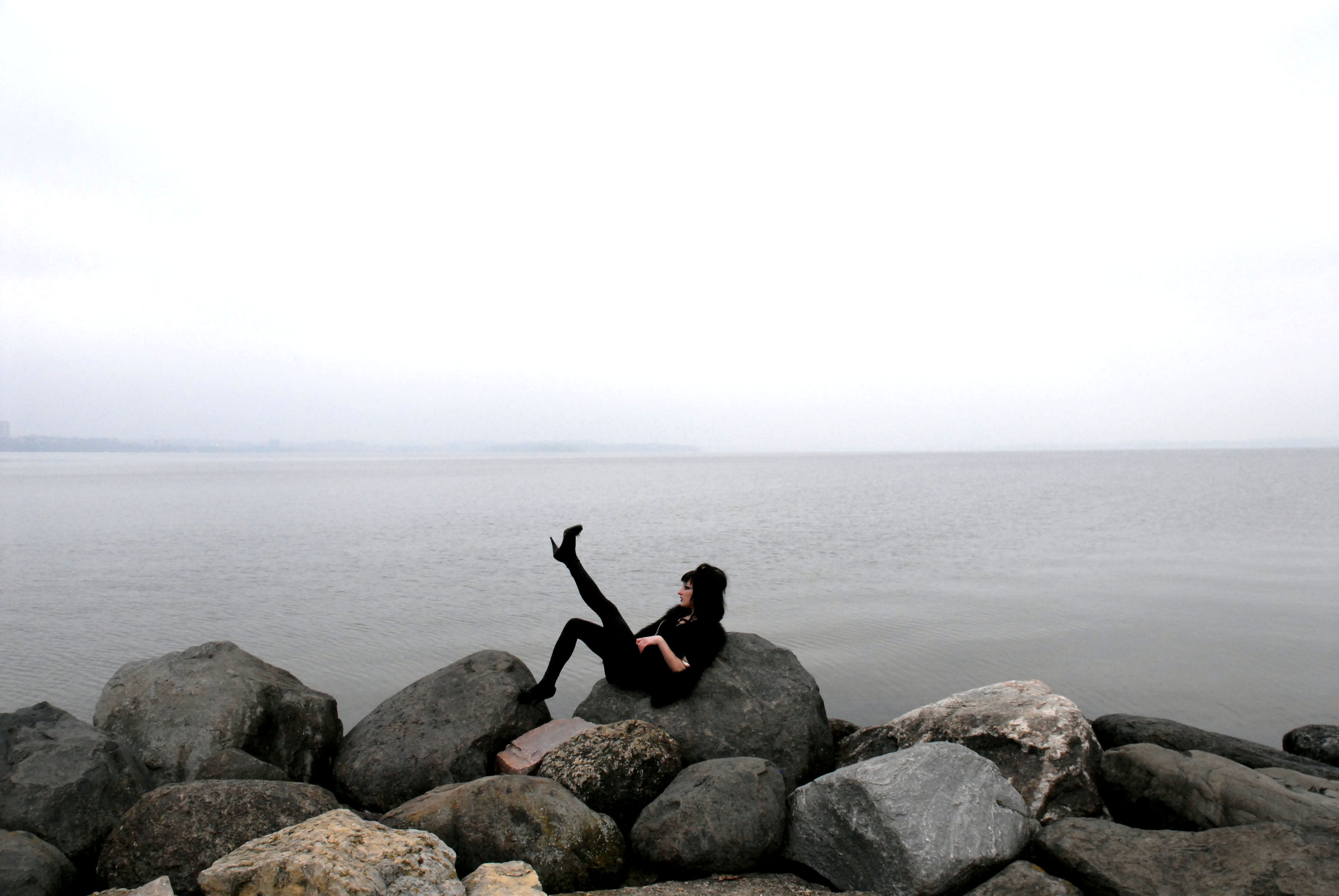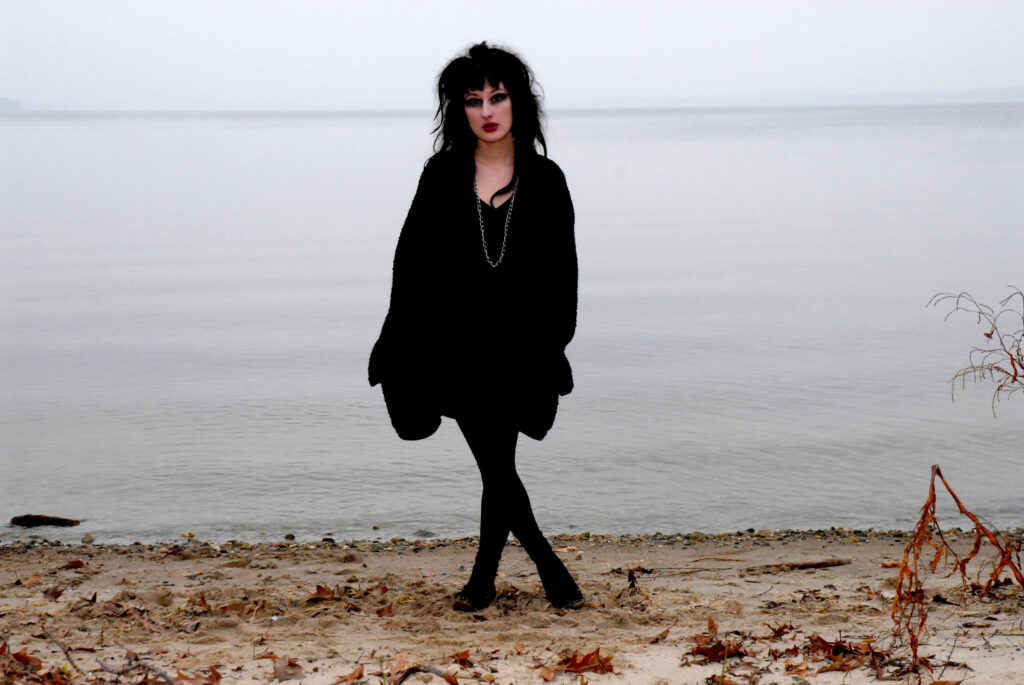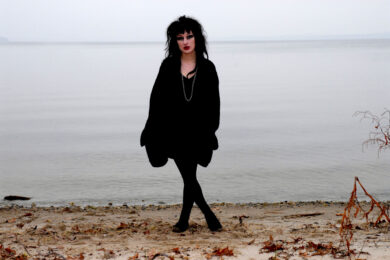Zola Jesus is Nika Roza Danilova, a 21-year old vocalist from Madison, Wisconsin currently juggling university – she’s winding up an undergraduate degree in French and philosophy – with being one of the most remarkable and talented young musicians of the era.
Nika’s musical career began at the age of 10, when she studied opera and applied to New York’s prestigious Juilliard School. Her application was denied, but when Danilova reinvented herself as Zola Jesus in high school and started to record songs in her bedroom, that voice re-emerged. 2009’s The Spoils, released on Sacred Bones, unfurled an epic sort of gloom-pop deliberately tarnished with lo-fidelity scuzz, but songs like ‘Clay Bodies’ rose above the rubble thanks to Nika’s huge delivery, full-hearted and powerful in a way that that melds a familiar diva dynamic to an abrasiveness practiced by scream queens like Diamanda Galas and Lydia Lunch.
Zola Jesus has one heel in noise music: recently reissued is her highly recommended split album with fellow Wisconsin musician Clay Ruby, aka "horror electronics" practitioner Burial Hex. Her new EP Stridulum, however, strips away a lot of the scuzz, and it’s little short of a revelation. Cool, bottomless synths and crashing, martial drums tether down six commanding songs about love and death that filter up to the gods. It’s perhaps lame and reductive to pose it, but Zola Jesus reminds me of a young Joanna Newsom, in a way; classically trained, but contortion her formal musical understanding into an experimental, intensely personal vision with imagination to burn.
Nika probably should have been studying or something, but she was good enough to take an evening out to answer some questions about transgressive art, writing love songs, and what a goth does when goth comes into vogue.
So if it’s not too gauche a place to start, when did you discover that you had a voice? I know you studied opera, but did you feel you wanted to sing before that, or was it that that put you on a stage?
Zola Jesus: I never really knew I had a voice, I just really wanted one. I’ve always sung and loved how it felt physically, like it was a release. I learned a lot of techniques that I use often when performing. More lately I’ve been trying to forget them in order to try to explore new areas of my voice that otherwise would be ignored.
How do you write, and how do songs come together? Does it start with the voice, vocal melodies, or with lyrics, or fragments of tune?
ZJ: It depends from song to song. Often it starts with a vocal melody, sometimes a drum beat, or even a sound texture – anything that pulls a song out of me.
It strikes me that the drums feel like they play a really heavy role too, although they’re used quite unusually – lots of sparse, beaten toms…
ZJ: I love drums, in a very primal way. I never thought beats had to be complicated, so long as they’re heavy and rhythmic. I’m usually attracted to really big beats, driving and grinding, which can be heard in the songs, I’m sure.
Is there anything in particular that bonds together the songs on Stridulum? Google brings up that it’s a 1979 film in which "the soul of a young girl with telekinetic powers becomes the prize in a fight between forces of God and the Devil…", which I guess might be significant?
ZJ: Everything about that film plays a part in the album. It was a forgotten film, too quick to be thrown in the trash. It’s a beautiful, well-made film, albeit with lots of holes, but still it shines. I knew going into recording that I had a very short amount of time to make the new EP, but I wanted to put everything into it. I figured I might sink, maybe I bit off more I could chew, but I was going to give it everything I had. The plot was also very intriguing to me, as this was my effort to let the light take over in the music, possibly for the first time. I even used a clip from one of the scenes in the title track, ‘Stridulum’.
‘I Can’t Stand’ and ‘Night’ are songs about love and lovers, but often with a dark pall – "I’m on my bed/My bed is stones/But in the end of the night/We¹ll rest our bones." Is it easy to write about relationships and love? So many love songs have been written, but it’s a topic that seems to be endlessly giving… maybe it’s all about the bit of yourself that you leave within them?
ZJ: I usually hate love songs, I think they’re lazy and often boring. But recently I fell in love, and my love was a huge influence in making me wanting to create so much bigger than myself. I was getting out of a very dark period, so this love finally felt like a new beginning. I wanted to write an album that was emotionally challenging to me, as this was the first time I’ve felt hope for myself, for humanity, for love, for everything. The record is very honest, I say it as it is.
Listen to ‘Clay Bodies’ here.
There’s a song on Stridulum called ‘Manifest Destiny’, which is an interesting term – originally I gather it referred to American growth and aggressive expansion in the 1800s, real ‘chosen people’ stuff. But I can’t make out the lyrics, so it could be (probably is) about something else entirely…?
ZJ: The song, to me, represented what’s to come. ‘Manifest destiny’ was a term from the 1800s that described the ideal of America expanding coast-to-coast. As it wasn’t always that way, it was an ideal for Americans that expressed a possibility to take on the rest of the continent for their own. It is my way of saying ‘this is just the beginning’.
You’ve spoken a little about being into power electronics and early industrial music – how did you get into that stuff, what’s the stuff you enjoy most, and what’s the appeal? Is there something about quote-unquote ‘transgressive’ art in general that attracts you?
ZJ: I’m really attracted to the aggression in power electronics and industrial music. It’s very confrontational, very dark, and not afraid to face uncomfortable themes. I respect when something isn’t easy, especially art. Noise isn’t easy to listen to for most people, and noise artists don’t make it any easier. Even if you can handle the frequencies, the conceptual topics covered by artists like Taint, Mikko Aspa, Brethren, etc… are all incredibly controversial. Rape, paedophilia, anti-semitism, terror, the Holocaust, whatever…it’s not that I’m attracted to these themes because I support them, but because they’re challenging human emotion. It’s all about the mood and the deception of the music that is so intriguing to me. And sonically-speaking, there are definitely some musicians out there putting out material where I can’t tell what the hell they’re doing to produce the sounds. To me, that’s fresh, that’s what is shifting the status quo. I’ve heard the sound a guitar can make in a punk band. Do something else with it…
Content-wise, is there stuff that’s like, shit, too far or are you pretty inured or comfortable with extremity?
ZJ: Sometimes when listening to the records of Brethren or Taint it gets to a point where I feel pretty disgusting listening to the vocals and samples – but that’s the point. It¹s not supposed to be a comfortable thing to listen to. You’re not supposed to be listening to these samples of interviews with children of rape and think ‘oh man, this rules!’ It’s not supposed to feel good. I feel like if it did, that would be defeating the purpose. There are artists that are seriously misogynist and people always wonder why I listen to their music – sure, I can ignore them or protest them as a woman, but don’t you think it would piss them off more if they knew a woman was legitimately listening to what they have to say? Most of those men are probably just afraid of women in the first place, anyway.

What’s your approach to production? I didn’t really notice it before, but listening to Stridulum and then going back to stuff on The Spoils, it’s obviously got a more lo-fidelity sound going on. Is that something you’ve done and you’re beyond now, or might you revisit it?
ZJ: Production used to be a big part of the sound for me, since in having that lower quality recording gave it timelessness, and also created the opportunity to discover new sounds that can only exist in a distorted atmosphere. I really liked that about lo-fi, that in disregarding good production I got to blend industrial sounds with pop songs. But with Stridulum, I wanted to try something different. I think it’s important to grow as an artist and continue to challenge yourself. After having done that style of production for the past couple of years I felt I wanted to focus on my songwriting and also prove that I wasn’t relying on that fuzz. A lot of times lo-fi is a way of covering up flaws, and Stridulum was my way of proving to myself and everyone else that I didn’t have anything to hide.
For want of a better word, a sort of ‘gothiness’ seems to have crept back into (especially American) indie-rock – yourself, and stuff like Blessure Grave, some of the Wierd Records stuff, Cold Cave perhaps. Apart from the fact that style goes in cycles, any thoughts on why that aesthetic might have returned?
ZJ: Twilight? Vampire movies, maybe? Everyone’s a goth now. It blows my mind. I don’t like to comment on this whole trend because I’ve come to resent myself being associated with it. If goth is trendy then I’m buying fucking polo shirts. They’ll still be black, though.
Listen to ‘Sea Bodies’ here.
And finally, I think I heard there was going to be no full-length until 2011?
ZJ: I’m in university, and when I’m not, I’m touring, moving, and working on the LP. The process of creating Stridulum was rushed and there’s a lot I wanted to do but couldn’t, due to time and what I had at my disposal. My next LP isn’t going to come out until I’m confident it’s something I think is worth people’s time to listen to and appreciate. It’s going to be a masterpiece, that’s all I can promise.
Podcast: Play in new window | Download



